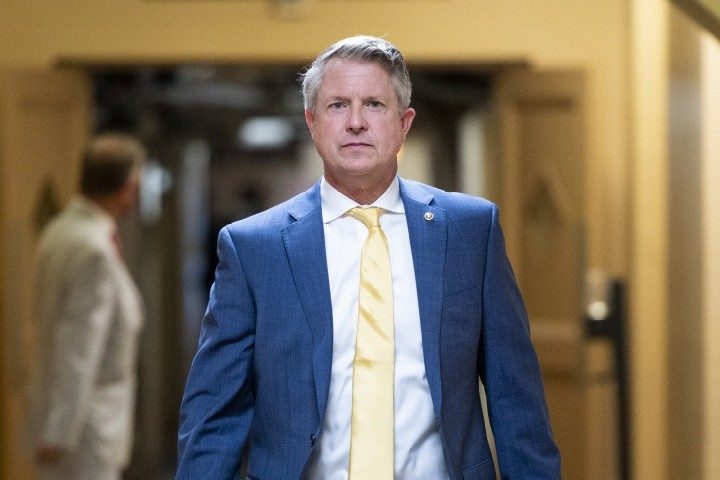
As Americans of all political affiliations are growing increasingly tired of the pandemic-related policies, the U.S. Senate passed a symbolic joint resolution Thursday calling for an end to the national emergency.
The resolution terminating the national emergency declared by the finding of the President on March 13, 2020 passed the Senate in a 48-47 vote. It was introduced by Senator Roger Marshall (R-Ky.) and was co-sponsored by Republican Senators Ron Johnson (Wis.), Ted Cruz (Texas), Rick Scott (Fla.), Rand Paul (Ky.), Mike Braun (Ind.), Mike Lee (Utah), and Steve Danes (Mont.).
“After nearly two years of living under this state of emergency, the American people are worn out and yearning to breathe free; they long for their God-given freedoms, and for leaders to take their side. There is no doubt, it’s time for our nation to learn to live with COVID,” said Senator Marshall in a statement following the vote.
On the Senate floor, the senator urged the Congress to “debate and ultimately repeal” the powers the federal government was granted thanks to the state of emergency, since such powers are “no longer needed.”
The senator quoted the recent Monmouth University poll that showed the overwhelming majority of the American public is ready to wind down the state of emergency in favor of a return to normalcy with the understanding that COVID will become a “part of their life.”
In addition to that, a Kaiser Family Foundation (KFF) survey published late January showed the fatigue about the pandemic affected most Americans: Seventy-five percent of respondents described themselves as “tired” of the pandemic, including 74 percent of Democrats, 72 percent of Republicans, and 80 percent of Independents.
The senator also implied the measure was justified back in 2020, when the novel virus had just made it to America. The emergency was justified even in February 2021, when COVID vaccines were unavailable to the general public. Today, however, the situation has changed dramatically, he said. Citing the 99-percent drop in cases and 85-percent drop in COVID hospitalizations in his home state, Senator Marshall said the disease is no longer a public health threat. He noted a high vaccination rate among Americans, and availability of effective therapeutics against COVID which he said were major factors that nullified the emergency.
The senator also noted the government cannot afford to spend any more money on the COVID response. “Democrats’ obsession with COVID has also resulted in an out-of-control spending and massive debt,” he said, referring to how Congress has appropriated a whopping $6 trillion to COVID response. A significant part of the funds was allocated while the problem “was already fixing itself,” said the senator.
The national state of emergency was first declared on March 13, 2020 by President Donald Trump under the National Emergency Act (NEA). President Joe Biden extended it in February 2021 and then again in February 2022.
While the resolution is unlikely to pass the Democrat-controlled House of Representatives, and therefore unlikely to make it to President Biden’s desk for his approval or veto, the resolution is viewed by the senator as a “symbolic victory to our citizens that normalcy is around the corner and that limited government and our constitutional rights still reign supreme.”
Observing the recent developments in neighboring Canada, where Prime Minister Justin Trudeau invoked an Emergencies Act to quell the trucker convoy protests, Senator Paul warned of the dangers related to such extreme measures.
During an episode of the BASED Politics podcast that aired late February, Paul said, “”I think statutes that allow presidents or heads of state to invoke emergencies are very, very dangerous.” He added, “We have the same sort of statutes here.… We actually have in the United States an Emergency Act that allows the president to shut down the internet.”
The Biden administration vowed ahead of the Senate vote that if the legislation reached Biden’s desk, he would veto it. The statement released by the White House said, that “Continuing to protect against COVID-19 and ensuring that our response remains nimble are top priorities of this Administration,” therefore the administration “strongly opposes Senate Joint Resolution 38, which would terminate the national emergency … and unnecessarily and abruptly curtail the ability of the Administration to respond to the COVID-19 pandemic.”
It concludes that if the Congress decides to strip the administration of the emergency powers, it would be “a reckless and costly mistake.”
The statement seemingly contradicts the spirit of the just-released so-called National COVID-19 Preparedness Plan (covered by The New American here), a roadmap “to help us fight COVID-19 in the future as we begin to get back to our more normal routines.”
“Because of our work, we are no longer going to let COVID-19 dictate how we live,” reads the strategy.
The COVID-related pandemic response is becoming increasingly softened with the governors in deep-blue states dropping the measures such as masking, vaccine passports, and social distancing.
Last week, the Centers for Disease Control and Prevention (CDC) announced a change to the metric it uses in recommending face coverings. When evaluating COVID community levels, the agency has shifted from counting COVID cases to factoring in hospital beds being used, hospital admissions, and the total number of new COVID cases in an area. As a result, more than 90 percent of the U.S. population now apparently lives in areas with low or medium COVID community level.





